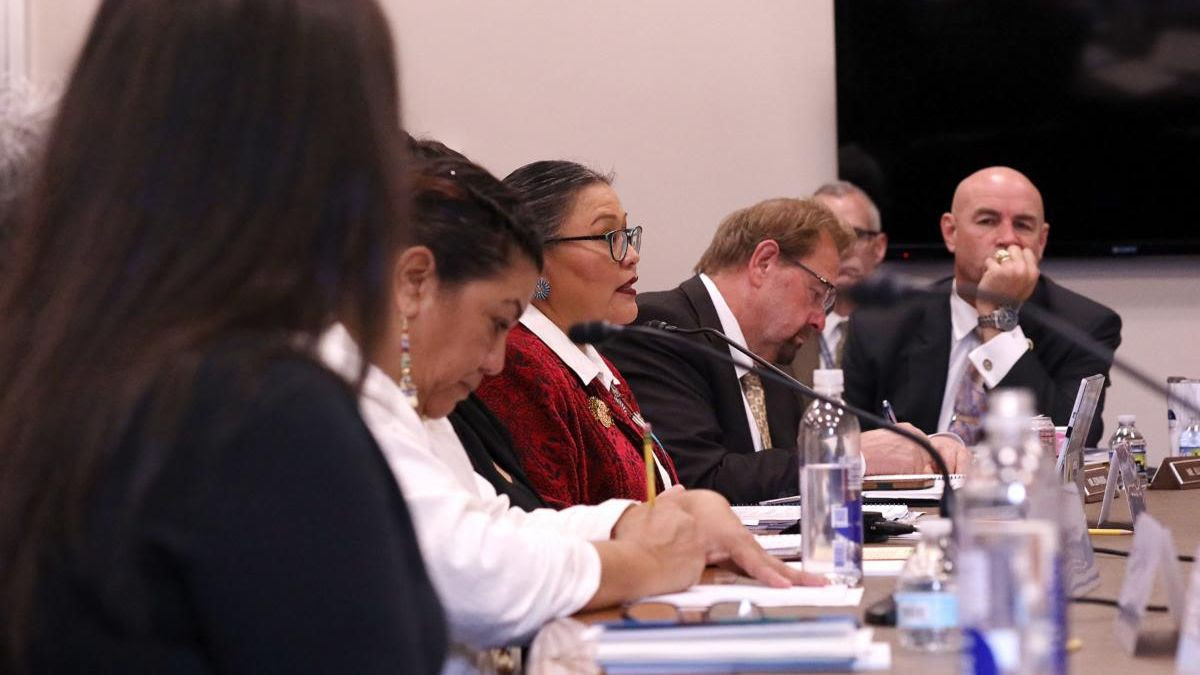
- Details
- By Native News Online Staff
Last week, during a pivotal hearing before the U.S. House Interior and Environment Appropriations Subcommittee, Law and Order Committee Chair Eugenia Charles-Newton delivered a compelling testimony emphasizing the urgent need for federal action to address the crisis of Missing and Murdered Indigenous People (MMIP).
“We must stop pretending these cases are isolated, and we must stop allowing them to be swept under the rug,” Charles-Newton declared, highlighting systemic failures that leave countless cases unresolved.
She underscored the challenges posed by jurisdictional complexities, communication breakdowns, and the severe lack of resources for law enforcement—factors that collectively impede justice for affected communities.
Charles-Newton drew attention to the 75 Navajo Nation members currently missing, many of whose cases remain unsolved due to jurisdictional confusion and poor coordination between federal, state, and tribal authorities. She shared the story of Zachariah Shorty, a Navajo man who disappeared in 2020. Despite being reported to local authorities in Farmington, New Mexico, jurisdictional disputes delayed action from Navajo Nation law enforcement. By the time they were able to investigate, Zachariah was found dead, and his killer remains at large.
“This is just one example of how jurisdictional confusion and lack of resources leave families without answers,” Charles-Newton said. “This must stop. We are doing everything we can with the limited resources we have, but we need Congress to act. The Navajo Nation alone spans over 27,000 square miles with a population of more than 250,000, and it is the largest Native American tribe in the U.S. We have the right to expect better protection from the federal government.”
Her testimony was supported by alarming statistics shared by other lawmakers. Congressman Mike Simpson noted that over two in five Native women experience rape in their lifetimes, Native Americans account for 46% of all trafficking victims in the U.S., and 19 Native Americans are reported missing for every 1,000 individuals—a staggering rate that demands urgent intervention.
While the 2013 reauthorization of the Violence Against Women Act (VAWA) marked progress, Charles-Newton and other advocates emphasized that significant obstacles remain. Many cases are either declined or go unprosecuted, leaving perpetrators unaccountable.
Advocates such as Abigail Echo Hawk and Cheryl Horne called for increased resources and improved coordination between law enforcement agencies, especially in rural and urban areas where Indigenous communities are often overlooked. "It's not just about jurisdiction; it's about accountability," said Echo Hawk. "Resources intended for our communities are not being distributed as they should, and we are left to pick up the pieces."
Charles-Newton concluded her testimony with a direct appeal to Congress, “Education and understanding are the first steps, but we must act. These cases can no longer be forgotten.”
She urged the federal government to take immediate responsibility, address the crisis, and ensure justice for Indigenous victims.
Chairman Tom Cole (R-OK), a tribal citizen of the Chickasaw Nation, wrapped up the hearing by emphasizing the need for bipartisan cooperation. “This is not a partisan issue; it’s a national issue,” Cole said. “The partnership of federal, state, and tribal leadership is essential if we are to make real progress in ending violence against Indigenous women and girls.”
More Stories Like This
Native News Weekly (August 25, 2024): D.C. BriefsNavajo Nation Mourns the Passing of Former Vice President Rex Lee Jim
Deb Haaland Earns Endorsement From Communications Workers of America Local 7076
University Soccer Standout Leads by Example
Two Native Americans Named to Democratic Congressional Campaign Committee's“Red to Blue” Program
Help us defend tribal sovereignty.
At Native News Online, our mission is rooted in telling the stories that strengthen sovereignty and uplift Indigenous voices — not just at year’s end, but every single day.
Because of your generosity last year, we were able to keep our reporters on the ground in tribal communities, at national gatherings and in the halls of Congress — covering the issues that matter most to Indian Country: sovereignty, culture, education, health and economic opportunity.
That support sustained us through a tough year in 2025. Now, as we look to the year ahead, we need your help right now to ensure warrior journalism remains strong — reporting that defends tribal sovereignty, amplifies Native truth, and holds power accountable.
 The stakes couldn't be higher. Your support keeps Native voices heard, Native stories told and Native sovereignty defended.
The stakes couldn't be higher. Your support keeps Native voices heard, Native stories told and Native sovereignty defended.
Stand with Warrior Journalism today.
Levi Rickert (Potawatomi), Editor & Publisher


